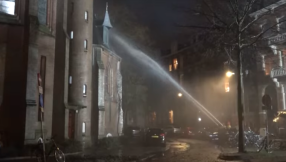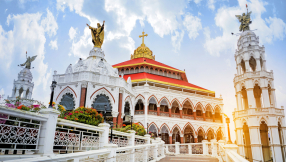
Evangelist Nick Vujicic, who has spent much of his life speaking hope into the lives of millions across the world, is now turning his focus inward - toward the Church itself.
Nick is an extraordinary Christian witness and motivational speaker whose life powerfully transcends physical limitations.
Born with tetra-amelia syndrome - a rare disorder characterised by the absence of all four limbs - Nick has faced immense challenges since birth. Yet through resilience, faith, and determination, he has turned adversity into inspiration, becoming a global symbol of hope and possibility.
His latest message is both urgent and pastoral: if we truly believe in healing, we must practise it, and that means rediscovering the importance of Christian counselling.
Speaking recently from Grapevine, Texas, Vujicic addressed what he sees as a growing crisis within the Western Church - not a lack of faith, but a lack of care. While believers gather each week to hear the Word, many are sitting in pews with wounds no sermon alone can reach.
"We’ve got Christians who are saved, bleeding on their way to their graves," he said.
His concern is not abstract; it’s rooted in experience. Vujicic himself has benefited from counselling, and over the years has journeyed alongside countless others in search of healing.
Yet within many churches, the very idea of seeking help remains clouded in discomfort.
Vujicic highlights the essential need for “having accountability, moving forward, and dreaming big again,” but, he insists, “going back to the dreams of what is His dream for the Church, which is unity”.
Recent data from the Barna Group shows that while society as a whole is becoming more open to counselling, the Church is falling behind.
Only 15% of practising Christians surveyed said they had sought treatment for mental health concerns, compared to 33% of non-Christians. And when it comes to specific struggles like pornography - a silent epidemic among believers - more than half admitted to battling it, but only 10% reported that their church offered any form of support.
To the no-nonsense Vujicic, born in Melbourne, Australia, this is not merely a missed opportunity. It’s a failure of discipleship. The Church, he insists, must be more than a place of inspiration; it must become a place of restoration. That means not only preaching the truth, but also creating space for people to confront their grief, trauma, guilt and fear with honesty and grace.
Vujicic believes that every believer could benefit from one-on-one counselling. “We all need counselling,” he said. “We all have addictions, from ebbs and flows and ups and downs, widows and widowers - everything in between. There are people being bullied at school every single day. How about counselling them? How about the veterans? The churches don’t even talk very much about veterans because they don’t know how to equip and encourage them along the way.”
He calls the Church to meet people where they are, offering healing through shared responsibility, honest conversation, and renewed hope. Christian counselling, in his view, is not an optional extra, but a vital expression of love rooted in the Gospel.
His call goes beyond individuals. The Church itself must repent for where it has fallen short - preaching grace but failing to practise it, prioritising appearances over honesty.
"God loves us so much, He wants all of us, and God doesn’t have all of us yet," he said. "So He may allow some crazy things to happen before we actually repent."
For Vujicic, the vision is a Church that ministers patiently to veterans, wisely to grieving families, and tenderly to those battling shame or addiction. A Church that fosters accountability not to control, but to nurture growth. A Church that helps the wounded dream again - not of worldly success, but of full surrender to God’s plan.
What he urges is not a programme or trend, but a return to the Church’s ancient and essential role: a place of healing. Not quick fixes or shallow reassurance, but slow, Spirit-led restoration. Christian counselling is indispensable to that work.
As ever, the world is offering its own answers, but Nick Vujicic believes the Church holds something far greater.
The question is whether we are willing to face brokenness honestly and journey together toward wholeness.
If we are, healing will not just be a hope; it will become a reality - one life, one conversation, one soul at a time.













